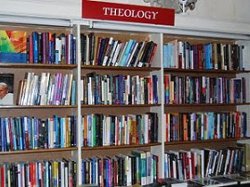Look Who's Separating Now
 By Norm Olson. Republished with permission from Baptist Bulletin Jan/Feb 2012. All rights reserved.
By Norm Olson. Republished with permission from Baptist Bulletin Jan/Feb 2012. All rights reserved.
In an ecumenical age when Christians are expected to shed their differences in order to achieve whatever man-made unions can be mustered, Bible-believing fundamentalists are often castigated for emphasizing pure doctrine. We’re seen as negative, obstructionist, bigoted. “Separation” becomes a dirty word, an old-fashioned idea from another era.
But in recent days a most interesting phenomenon has been taking place—people in mainline denominations are separating in droves! Three groups in particular have been in the news: the Episcopal Church USA, the Evangelical Lutheran Church in America, and the Presbyterian Church USA. These groups, rather than experiencing the unity they are so adamant about, are witnessing a proliferation of new denominations or associations composed of dissatisfied members. Why are these people leaving and forming these new groups? Are certain Biblical teachings nonnegotiable after all?
Before taking a look at each of these three representative groups, one should note that the mass exodus of people from these denominations is actually not new and has been occurring for many years, particularly since the late 1950s. I spent the first 11 years of my life in an ELCA church, and I remember vividly the events surrounding my parents’ seeing ominous clouds on the horizon in the group even in the late ’50s. As born-again believers, they felt the need to leave for doctrinal reasons, as did a number of other families and individuals. The exodus continued. Between 1988 and 2008, the ELCA lost 737 congregations and 654,161 members. Some congregations lost up to 50 percent of their members. Denominations lost millions of dollars in annual giving.
Today the issue of homosexuality has become the last straw, finally grabbing the attention of church members in the fracturing groups. More than a social issue, the religious acceptance of homosexuality reveals the long-term denominational drift regarding the authority of Scripture in all matters of faith and practice.
Discussion
Brian McClaren rejects American exceptionalism, calls for closing of Gitmo
Body
Discussion
NIV 2011 has stronger wording agianst homosexuality?
Body
Discussion
Thoughts on the Year's Reading
 Republished with permission from Craig’s blog, Theology for the Road.
Republished with permission from Craig’s blog, Theology for the Road.
“No matter how busy you may think you are, you must find time for reading, or surrender yourself to self-chosen ignorance” (Confucius).
For the longest time I hated to read. Yes, “hate” is a strong word but that is how I felt about reading. I even hated reading my Bible (heresy, I know!). Don’t get me wrong. I loved my Scofield Study Bible that I used for 18 years. I just didn’t like to read—period. I remember crying as my dad (who was himself a reader) would have me sit down and read my Bible. I dreaded the reading plans he made for my three siblings and myself. I was always behind in grammar and reading in school which was a result of my lack of desire to read.
Where it all began
Then one day things changed. I went from hating reading to loving reading. During my senior year in high school my youth pastor decided to meet with me every Monday for the whole year to mentor me since I wanted to go into ministry. I will never forget that first meeting. He took me to a fast food restaurant. He sat me down and plopped down three books on the table. My heart sunk. He told me to start reading them and we were going to discuss them together along with other things. At this point I had no choice. I had to read them and there was no saying no. I went home and began to read them. Call it divine intervention or what have you but all of the sudden I began to love reading—and I found that I couldn’t stop.
Today I have a good sized theological library for someone who is not in ministry. I have purchased books while I was in and out of school. I found books for free at different places and this last year I was able to use this blog to acquire more books which I in turn reviewed. I also won a number of books by entering giveaways.
Discussion